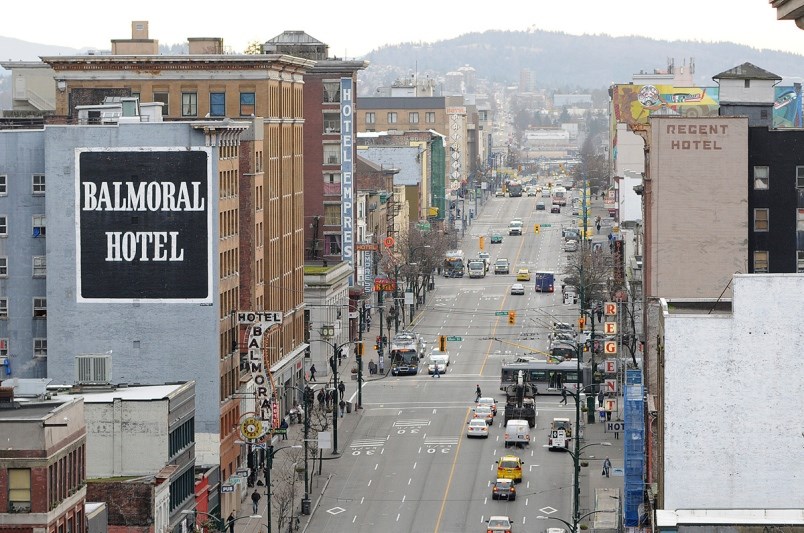So the provincial election campaign is on.
Bored yet?
You shouldn’t be.
Especially if you call Â鶹´«Ă˝Ół»home.
In case you need to be reminded, more people are dying of a drug overdose than at any time in the city’s history. More people are homeless than ever before, too. That’s just nuts, sad and embarrassing.
We’re supposed to be better than this Vancouver.
But here we are.
And there I was last week listening to city councillors and city staff talk about the increase in homelessness, the ongoing fight to clean up single-room-occupancy hotels and how life in the Downtown Eastside is still a grind for many of the 19,955 residents who live there.
The opioid overdose crisis was also on council’s agenda, with provincial health officer Dr. Perry Kendall giving us the grim news that one year after he declared a health emergency, the morgue is still very much a busy place.
Regular readers can already guess what Ěýthe response to all this doom and gloom was from Mayor Gregor Robertson and his councillors -- that the provincial and federal governments have to invest way more in housing and treatment, which are two areas those governments have more cash and latitude to deal with than city governments.
But as I heard from Robertson and anti-poverty activist Jean Swanson after one of the meetings, our city is not so much in the grips of a homeless and drug addiction problem, but in an inequality problem. Both of them contend that a big first step to helping the city’s most vulnerable would be to substantially raise welfare rates.
“It’s the most basic support that the provincial government can offer,” the mayor told me.
Swanson: “Look at Craigslist and see what it would take to rent a place. That’s what the shelter rate should be.”
Shelter rate of $375
As you’ve probably heard, the rates have not been raised in 10 years. The basic welfare rate for a single person is $610 a month. It’s about $1,000 a month for a person with a disability. In both categories, $375 of that money is dedicated to housing costs.
Any idea where you can get a place to stay in this city on that kind of income?
If you guessed a single-room-occupancy hotel in the Downtown Eastside, you’re partly right -- partly, because the average monthly rent for a room in a privately owned and operated hotel in the area is $548.
A city staff presentation showed 43 buildings (2,060 rooms) were renting for $375 to $450 per month. Another 25 buildings (995 rooms) cost $450 to $599 per month. At the top end, 22 buildings (860 rooms) were going for $600 and higher, including nine hotels that Swanson and friends determined were renting for an average of $1,101 a month.
Many of the owners have told city staff that maintaining their buildings is difficult, if not impossible, to do when tenants are charged $375 per month for rent. They say they need more rent money to properly operate the hotel, renovate the hotel and complete necessary repairs.
The city understands that and is now looking to increase grants to owners for upgrades from $5,000 per room to $10,000. The city also wants to develop a loan program for owners.
I heard that 30,000 people were on welfare in Vancouver, with about 10,000 living in the Downtown Eastside. I also heard that almost 1,000 people are homeless in the Downtown Eastside and that single-room-occupancy hotels are the last stop before a life on the street.
Both Swanson and Robertson say doubling the shelter rate of $375 is a no-brainer. They say it would go a long way to getting those people on the street into housing, where they can get stable. Then treatment and counselling could follow for those who need it.
But that’s up to the next provincial government to decide.
Political party promises
If elected, the NDP promises to immediately raise all income assistance and disability rates by $100 per month, and allow those who go back to work to keep an additional $200 a month in earning exemptions. The Greens say a person collecting $610 in welfare will collect $915 by 2020.
The Liberals?
The party is not interested in raising the rates.
Jobs, jobs, jobs is the Liberals’ answer to reducing the number of people on welfare.
In fact, the party says it has reduced the number of people dependent on income and disability assistance by 59,000 since 2001. B.C. also became the first province to fully exempt child support payments for families on income or disability assistance, and introduce annual earning exemptions of $9,600 per year for persons with disabilities.
As well, Liberal leader Christy Clark said in a letter attached to her party’s platform that, under her government , 4,600 “moms and dads started their path from welfare to work” under an employment program called the Single Parent Employment Initiative.
The party’s platform says the program was created in response to “hearing of a series of practical barriers within the government’s system of supports that created a disincentive to single parents on income or disability assistance who wanted to find work or improve their training for a job.”
In other words, the jobs are out there and the government wants to help you find one.
But how exactly does that approach apply to the majority of 10,000 welfare recipients in the Downtown Eastside who collect welfare and are physically and mentally unable to work? Or those who can't afford to work for fear of being penalized for earning a few more bucks on top of their welfare income?Ěý
They probably deserve an answer before voting day.
@Howellings
Ěý
Ěý
Ěý



